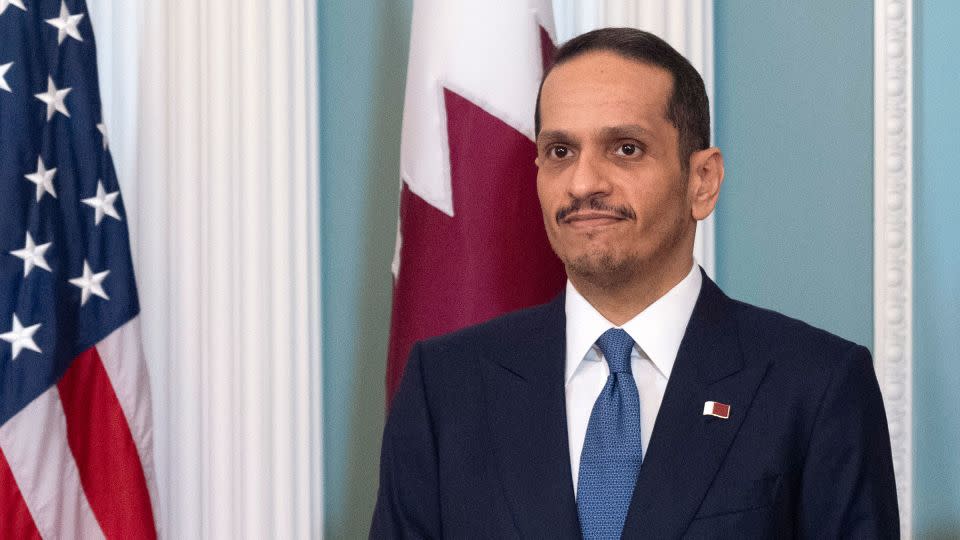Broad framework for a potential hostage release and ceasefire in Gaza is being presented to Hamas

- Oops!Something went wrong.Please try again later.
A broad framework for a hostage release and potential ceasefire in the war between Hamas and Israel was agreed to among negotiators in Paris this weekend, according to an official familiar with the talks.
While there is a basic framework that negotiators feel they can move forward with, the “details are going to be very difficult” to work out, the official said. Even though negotiators came to terms on the broad strokes, the office of Israel’s prime minister indicated Monday that there are concerns about “conditions that are not acceptable.”
Egyptian intelligence delivered the framework to Hamas in Rafah on Monday, the official said.
The framework would call for a first phase of civilian hostage releases to take place over a six-week pause with three Palestinian prisoners held by Israel released for each civilian hostage returned from Gaza. That ratio would be expected to go up for Israel Defense Forces soldiers and a longer pause is possible beyond the six weeks for the later phases.
It is a melding of different proposals from Israel, Hamas, Qatar and Egypt, along with additional ideas from the United States. The proposals differed on the length of the pause and ratios for swapping prisoners and hostages.
Multiple officials have voiced optimism that the proposal could advance a process toward an eventual release of the remaining hostages held by Hamas and a sustained cessation of fighting in Gaza. However, they have cautioned that there are still many details that need to be fleshed out – and Hamas still needs to engage in a constructive way.
“I believe the proposal is a strong one, and a compelling one that, again, offers some hope that we can get back to this process,” Secretary of State Antony Blinken said on Monday. “But Hamas will have to make its own decisions.”
The top US diplomat did not offer details about the proposal.
Sunday’s discussions made “good progress to get things back in shape and at least to lay a foundation for the way forward,” Qatari Prime Minister Mohammed bin Abdulrahman Al Thani said earlier Monday.
“We are in much better place than where we were a few weeks ago,” Al Thani said at the Atlantic Council in Washington, DC.
Al Thani described the framework emerging from the discussions in France with himself, US CIA Director Bill Burns and the Israeli and Egyptian intelligence chiefs as a combination of “what’s been proposed by the Israelis and what’s been a counter-proposal from Hamas.”
“We tried to blend things together to come up with some sort of reasonable ground that brings everybody together,” he said.
However, the Qatari prime minister downplayed the prospect of immediate results coming out of the talks. “We don’t know and we cannot predict what (Hamas’ response) will be and we are sure that we will be faced with some challenges and obstacles.”
Hamas must get “to a place where they engage positively and constructively in the process,” Al Thani said.
The sides have been unable to reach an agreement to release more hostages since one in November collapsed. That agreement resulted in a weeklong pause in fighting in exchange for the release of more than 100 hostages and another deal to free the more than 100 who remain would be a major breakthrough at a time of huge tension in the Middle East as concerns grow about a wider regional conflict breaking out.
In the months since, the IDF has continued its offensive in Gaza aimed at eliminating Hamas in retaliation for the group’s October 7 attack, which killed more than 1,200 people. Another 250 were abducted in that attack.
Israeli attacks on Gaza since October 7 have killed at least 25,700 Palestinians, according to the Hamas-run Ministry of Health in Gaza. CNN cannot independently verify the figures due to the difficulty of reporting from the war zone.
US officials have repeatedly rebuffed the idea of a “ceasefire,” but have supported the notion of a “pause” that would allow hostages to be released and additional humanitarian aid to reach the war-torn strip.
Blinken said that he discussed the “ongoing efforts” to free Israeli hostages and create an “extended pause” in fighting in Gaza during his meeting with Al Thani on Monday.
“This is critical to them being able to get to the formula that we’ve been talking about for putting a durable end to the cycle of violence that we’ve seen in the region for generation after generation, and the opportunity that exists to actually achieve it, an integrated Israel with relations with all of its neighbors, security commitments, assurances that it needs to make sure that it can move forward in peace and security, Palestinian Authority that’s reformed and a clear pathway to a Palestinian state,” Blinken said at a news conference with NATO Secretary General Jens Stoltenberg.
Coming out of the discussions in France, Al Thani is in Washington this week for meetings with top Biden administration officials.
CNN’s Michael Conte contributed to this report.
For more CNN news and newsletters create an account at CNN.com

